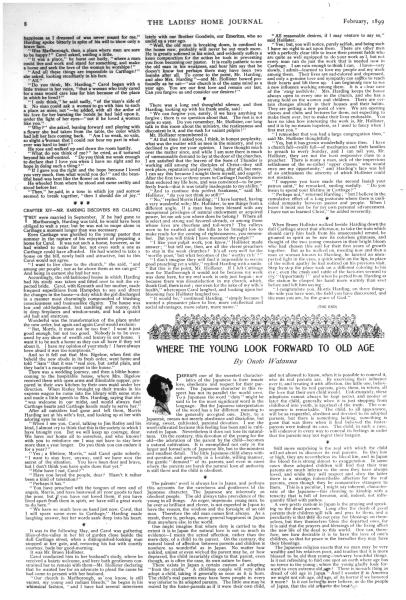Perhaps one of the sweetest characteristics of the Japanese is their innate love, obedience, and respect for their parents. The Japanese character in this respect has not its parallel the world over. To a Japanese the word “duty” might be said to be the most significant word in the language. But the Japanese interpretation of the word has a far different meaning to the generally accepted one. Duty, to a Japanese, means not merely obedience and discipline, but strong, sweet, cultivated, parental devotion. I use the word “cultivated” because this feeling has been and is cultivated in Japan. Nevertheless it does not lose its naturalness. On the contrary, this devotion of the young for the old—the adoration of the parent by the child—becomes a natural cultivation. It is exemplified not only in the larger and formal acts of Japanese life, but in the minutest and smallest detail. The little Japanese child obeys without question, and generally in a lovable, willing manner, the gentle “demand” of its parents, and even in cases where the parents are harsh the natural love of authority is still there and the child is obedient.
The parents’ word is always law in Japan, and perhaps this accounts for the sweetness and gentleness of the Japanese character. The Japanese are inherently an obedient people. The old always take precedence of the young in all things. An eager, impetuous young man, be he ever so brilliant and clever, is not expected in Japan to have the reason, the wisdom, and the foresight of an old man. Therefore the old man comes first always. As a result, there is, perhaps, more general happiness in Japan than anywhere else in the world.
One might imagine that where duty is carried to the extent it is in Japan the natural love is not so much in evidence—I mean the actual affection, rather than the mere duty, of a child to its parent. On the contrary, the natural bond of affection between parents and children is nowhere so wonderful as in Japan. No matter how unkind, unjust or even wicked the parent may be, or how depraved, the child invariably clings to that parent, even though, as is often the case, its own nature be finer.
There exists in Japan a certain custom of adopting “from the cradle.” A childless couple will very often adopt a child, taking it generally as soon as it is born. The child’s real parents may have been people in every way inferior to its adopted parents. The little one may be reared by the foster-parents as if it were their own child, and not allowed to know, when it is possible to conceal it, who its real parents are. By exercising their influence over it, and treating it with affection, the little one, believing them to be its real parents, gives them, in return, all the love that their own child would. Unfortunately, these adoptions cannot always be kept secret, and sooner or later the child, generally when it is just stepping from childhood into youth, is apprised of the truth. The consequence is remarkable. The child, to all appearance, will be as respectful, obedient, and devoted to its adopted parents, but there is something lacking, something is gone that was there when it had believed the foster-parents were indeed its own. The child, in such a case, will endeavor in every way to conceal its feelings in order that the parents may not regret their bargain.
Still more surprising is the zeal with which the child will set about to discover its real parents. Be they low or high, they are nevertheless its blood kin, and in Japan the blood tie is strong almost to exaggeration. In some cases these adopted children will find that their true parents are much inferior to the ones they have always loved, and while they will respect and obey the latter, there is a strange, indescribable affection for the real parents, even though they be comparative strangers to them. This is a peculiar, I might say inherent, characteristic of the Japanese—this cleaving to kinship with a tenacity that is full of heroism, and, indeed, not infrequently filled with pathos.
A very pretty custom in Japan is the praying and speaking to the dead parents. Long after the death of good parents, their children will talk and pray to them, and a peculiarity is that they do not pray for blessings on themselves, but they themselves bless the departed ones, for it is said that the prayers and blessings of the living affect the new life of the dead to this world. One can, therefore, see how desirable it is to have the love of one’s children, so that for peace in the hereafter they may have their blessings.
The Japanese religion exacts that no man may be very wealthy and his relatives poor, and teaches that it is more blessed to be old than young—two very beautiful things. Is it not refreshing to find one spot on earth where age has no terror to the young; where the young gladly look forward to even extreme old age? There is no such thing as dread of old age in Japan. And I wonder if in America we might not rob age, old age, of its horror if we honored it more? Is it not better to ever believe, as do the people of Japan, that the old are ever the best?
